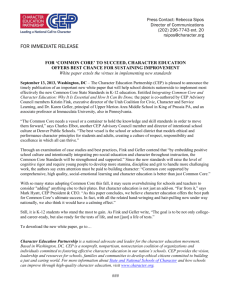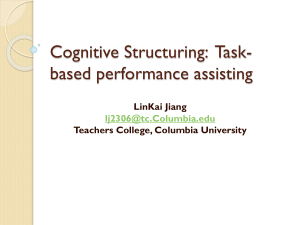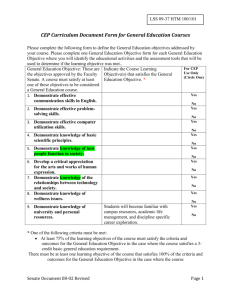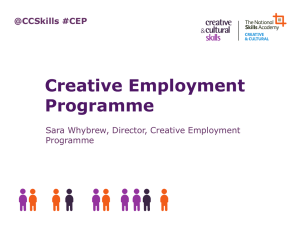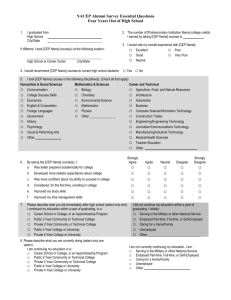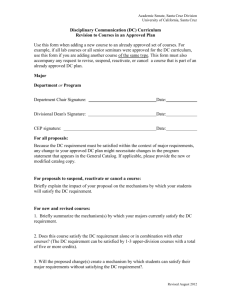department application for admission to graduate studey in
advertisement
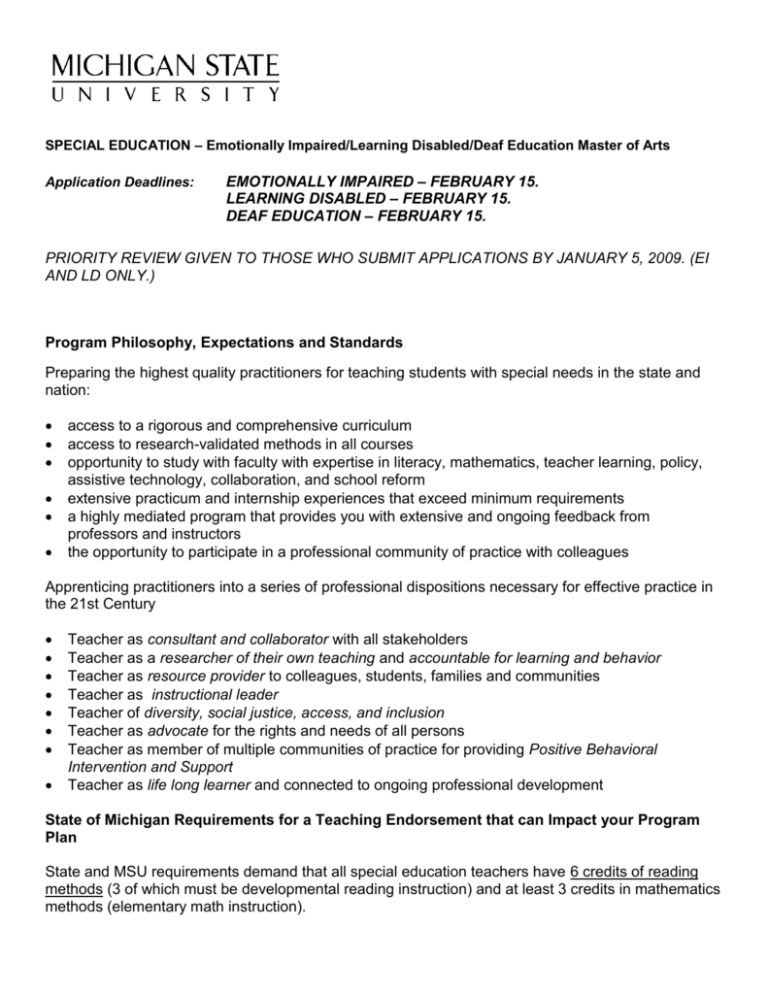
SPECIAL EDUCATION – Emotionally Impaired/Learning Disabled/Deaf Education Master of Arts Application Deadlines: EMOTIONALLY IMPAIRED – FEBRUARY 15. LEARNING DISABLED – FEBRUARY 15. DEAF EDUCATION – FEBRUARY 15. PRIORITY REVIEW GIVEN TO THOSE WHO SUBMIT APPLICATIONS BY JANUARY 5, 2009. (EI AND LD ONLY.) Program Philosophy, Expectations and Standards Preparing the highest quality practitioners for teaching students with special needs in the state and nation: access to a rigorous and comprehensive curriculum access to research-validated methods in all courses opportunity to study with faculty with expertise in literacy, mathematics, teacher learning, policy, assistive technology, collaboration, and school reform extensive practicum and internship experiences that exceed minimum requirements a highly mediated program that provides you with extensive and ongoing feedback from professors and instructors the opportunity to participate in a professional community of practice with colleagues Apprenticing practitioners into a series of professional dispositions necessary for effective practice in the 21st Century Teacher as consultant and collaborator with all stakeholders Teacher as a researcher of their own teaching and accountable for learning and behavior Teacher as resource provider to colleagues, students, families and communities Teacher as instructional leader Teacher of diversity, social justice, access, and inclusion Teacher as advocate for the rights and needs of all persons Teacher as member of multiple communities of practice for providing Positive Behavioral Intervention and Support Teacher as life long learner and connected to ongoing professional development State of Michigan Requirements for a Teaching Endorsement that can Impact your Program Plan State and MSU requirements demand that all special education teachers have 6 credits of reading methods (3 of which must be developmental reading instruction) and at least 3 credits in mathematics methods (elementary math instruction). Students who do not have a developmental reading and/or mathematics methods course must meet these requirements as part of their program in one of two ways: (1) taking CEP 855 (elementary math requirement) and/or CEP 842 (literacy prerequisite) through MSU, or (2) taking equivalent courses at another institution to meet these requirements. However, it is important to contact your advisor prior to taking a prerequisite course to make sure that it meets this requirement. In most cases, copies of the course syllabus will need to be submitted to your advisor for approval. The State of Michigan requires 6 credits of Human Growth and Development. The State of Michigan requires that a Technology requirement be met for all teachers. Overview of Master's Degree Program Leading to Endorsement Developing a Program Plan with Your Advisor Factors impacting your individual program plan: initial or second endorsement; type of endorsement (internship implications; electives) background requirements in reading, mathematics, human growth and development, technology prior coursework (waiving and replacing) elementary or secondary certification age of course (10 year rule) you may transfer up to 9 credits from with in (e.g Lifelong Learning) or outside the university (Exception: MSU returning students from 5-Year plan may be able to apply up to 12 credits taken during their Internship year) Program Plan Program Plan must be on file within one-year of your acceptance into the program Program must be completed within 5 years from the date of the first course listed on the program plan (Note: Extensions can be granted) The Program Plan is a contract with the University The Program Plan can be revised and is negotiated with one's advisor in response to the program requirements and the unique background, needs, and interests of the student We strongly recommend that you see your advisor as soon as possible once you are accepted into the Master's program to complete your program plan. Students will have an opportunity to meet with advisors during student orientation in May. SCOPE AND SEQUENCE OF COURSES: LEARNING DISABILITIES LD Initial Endorsement (second) Summer #1 CEP 449 Classroom and Behavior Management (3 credits) CEP 452 The Exceptional Child in the Regular Education Classroom (3 credits) Fall #1 CEP 802A CEP 894G Reflection and Inquiry I: Mathematics (3 credits) Practicum in Learning Disabilities (3 credits) Spring #1 CEP 804A CEP 894G Reflection and Inquiry II: Literacy (3 credits) Practicum in Learning Disabilities (3 credits) Summer #2 CEP 803A Professional Role in Teaching Special Education II: Assessment (3 credits) CEP 893F Internship in Special Education: Learning Disabilities (6 credits) Fall #2 CEP 451 CEP 801A Policy and Administration in Special Education (3 credits) Consultation and Collaboration in Special Education (3 credits) 1 Elective in Teacher Education Literacy: CEP 842, 843, 844, 845, 846, 847, 848, 849 (3 credits) Note: Students must complete or be taking CEP 451, CEP 801A, CEP 802A and CEP 804A before taking the Certifying Examination Students must be enrolled in a course the semester they are taking the Certifying Exam SCOPE AND SEQUENCE OF COURSES: Emotional Impairment Prerequisites: CEP 451 or equivalent CEP 452 or equivalent CEP 449 or equivalent Summer #1 CEP 885 Emotional and Behavior Disorders (3 credits) Fall #1 CEP 802A CEP 894H Reflection and Inquiry I: Mathematics (3 credits) Practicum in Emotional Impairment (3 credits) Spring #1 CEP 804A CEP 894H Reflection and Inquiry II: Literacy (3 credits) Practicum in Emotional Impairment (3 credits) Summer #2 CEP 803A Professional Role in Teaching Special Education II: Assessment (3 credits) Fall #2 CEP 827 CEP 801A Spring #2 CEP 828 Classroom, School and Community Programs for Students with Emotional Impairments (3 credits) Consultation and Collaboration in Special Education (3 credits) Behavior Analysis and Intervention for Students with Emotional Impairments (3 credits) Summer #3 CEP 893G Special Education Practicum: Children and Youth with Emotional Impairments Fall #3 CEP 829 Seminar in Emotional Impairments: Academic and Social Issues (3 credits) PRACTICUM REQUIREMENTS FOR MATH (CEP 802A/894) AND LITERACY (CEP 804A/894) 90 practicum hours are required in mathematics and 90 hours in literacy. Two or more students in the instructed group must have a disability that matches the endorsement area. Teachers need to have at least 6 contact hours in the instructed group each week in the subject area they are teaching. Teachers must arrange for an onsite supervisor within their district who has certification in the proposed endorsement area and obtain approval from MSU. A signed log of hours must be completed and turned in at the conclusion of the practicum. Placement should be within a 50 mile radius of MSU. The practicum experience must be completed in a public school setting. It is highly preferable that students are in the 3rd grade or higher in mathematics. Tutoring students outside the school setting is not accepted as a practicum experience. Pre-primary impaired classrooms are not generally acceptable for completing the practicum experience. Videotapes will be required in the math and literacy course (you will need to arrange for equipment). If you are currently employed as a special education teacher or are under emergency or temporary approval in a special education classroom, you may use your classroom to meet the practicum experience if they conform to the above guidelines (and if your setting has been approved by the instructor). If you are not currently in a special education classroom, you will be placed with a special education teacher in the area that you are seeking endorsement. SUMMER INTERNSHIP The LD summer internship is an intense, five-week experience that takes place in conjunction with both the East Lansing and Mason Public Schools from approximately the third week in June to the end of July or early August. (The EI summer internship is currently being redesigned.) We have typically utilized a co-teaching format where teams of two to three teachers are responsible for teaching a group of students throughout the duration of the summer program. The teaching day typically goes from 8:00 in the morning to 12 noon, with additional time added before or after the day for co-planning. A two hour weekly seminar also accompanies the Internship experience. Instruction occurs Monday through Thursday with the July 4th holiday off. The primary goal of the summer Internship is to allow Interns to practice and refine their literacy and math instruction that they learned in the MA Program. In this sense, we view the Summer Internship as a clinical teaching experience where Interns receive frequent and extensive feedback from both peers (e.g., reflecting on lead teaching of a colleague) and MSU supervisors on instructional, collaborative, and management skills. It is hoped that children with and without special needs can receive some individualized instruction from MSU Interns on a daily basis. Interns are responsible for pre and post assessment in literacy and mathematics, daily lesson planning, and home/school communication. Interns will also be involved in all professional development opportunities/faculty meetings that are expected of summer faculty. A self-reflective mid-term evaluation will be conducted by the Intern and discussed with the MSU supervisor. A final evaluation will be conducted by the MSU supervisor and signed by the Intern. Certifying Examination A certifying examination is required for all MA students in LD and EI. Students must apply for certifying examination with the program secretary during the first week of the semester that they will take the exam. Students must be enrolled in coursework at MSU during the semester they are taking the exam. Core courses must be completed prior to or be taken during the semester you are taking the certifying examination. The certifying examination is a five week take home examination. The certifying examination is taken in the final third of the Fall and Spring semesters only. No summer examination period is available. The certifying examination consists of 4 questions taken from core classes in the MA program. There is a page limit of 8 double-spaced pages per question. The examination is scored on a 0-4 scale by four different scorers. A mean of the four scores requires a 2.5 or above to pass the exam. Therefore, it is possible to fail an individual question and still pass the examination. Students receive a copy of the scoring rubric used by raters from each of the four questions. Failing the examination requires the development of an 'action plan' with the student's advisor. The student must retake the question(s) failed on the examination at the next regularly scheduled examination period. Successful passing of the certifying examination is required for completing the endorsement and MA program. PAPERWORK FOR COMPLETION OF ENDORSEMENT Students must successfully pass the State of Michigan Endorsement Test in their disability area before the State will issue an official endorsement. Information regarding the State of Michigan Endorsement Test can be found in the Advising Office in 134 Erickson Hall (dates that test are given; practice test booklets). Students must apply for their State of Michigan Endorsement in the Advising Office in 134 Erickson Hall during the first week of their final semester (MSU sends the State of Michigan documentation that you successfully completed the endorsement program in a disability area). Students must apply for graduation in the Registrar's Office (or online) during the first week of the final semester of taking courses. For information on State Endorsement Testing: http://www.mde.state.mi.us/ DEPARTMENT OF COUNSELING, EDUCATIONAL PSYCHOLOGY AND SPECIAL EDUCATION DEPARTMENT APPLICATION FOR GRADUATE SCHOOL ADMISSION Special Education Application Deadlines: LEARNING DISABLED/EMOTIONALLY IMPAIRED – FEBRUARY 15. DEAF EDUCATION – FEBRUARY 15. PLEASE RETURN THIS FORM Application for: Ms. Mrs. Miss Mr. Fall Semester 20 Type or Print Legibly! Last Name First Name PID (if previous MSU student) Birth Date Middle E-mail Address: Permanent mailing address: Phone (include international code) Day: Evening: FAX: Temporary (current) mailing address: Phone: Day: Evening: Last Date to receive mail at this address: FAX : Program for which you are applying: Special Education (choose concentration) Emotionally Impaired Learning Disabled Deaf Education Would you be interested in participating in research projects during a Master’s program? Are you interested in eventually pursuing a Ph.D. in Special Education? CONTINUED ON NEXT PAGE PLEASE RETURN THIS FORM Graduate Record Examination (GRE) – Date taken or planned: Scores: Verbal Miller Analogies Test – Date taken or planned: Score Quantitative /100 Analytical Percentile (THIS IS A REQUIREMENT FOR INTERNATIONAL STUDENTS) TOEFL Score (Total) Do you have a teaching certificate? Yes No If yes, subject area and level: Current work experience: Degrees earned (or in progress) Institution and location Undergraduate GPA last 2 years: Signature: Degree Field of Study-Major/Minor Overall Undergraduate GPA: Date: Date earned/expected Overall Graduate GPA: DEPARTMENT OF COUNSELING, EDUCATIONAL PSYCHOLOGY AND SPECIAL EDUCATION APPLICATION PROCEDURES FOR GRADUATE SCHOOL ADMISSION Special Education Application Deadlines: EMOTIONALLY IMPARED – FEBRUARY 15. LEARNING DISABLED / DEAF EDUCATION – FEBRUARY 15. DO NOT RETURN THIS FORM THE FOLLOWING INFORMATION IS REQUIRED: (Please use this as a personal checklist) __ University Admissions Application Application Fee: $50.00 www.grad.msu.edu/apply.htm __ Departmental Application http://ed-web3.educ.msu.edu/cepse/ __ Statement of Goals __ Two (2) official copies of transcripts from all previous institutions attended. These must be sent directly from the institution; please contact the Registrar’s Office at the institutions you attended for appropriate procedures and fee information. www.reg.msu.edu __ Three Letters of Recommendation Must be submitted on letterhead stationery of recommender’s school or company. __ Graduate Record Examination or Miller Analogies Test Information on testing may be obtained from the: MSU Counseling Center Testing Office 207 Student Services Building East Lansing, 517-355-8385 www.testingoffice.msu.edu __ Vita or Resume List professional experience, awards, honors, publications, presentations, professional affiliations, and professional development activities. PLEASE SEND ALL APPLICATION MATERIALS TO: Virgene Rector, Graduate Secretary CEPSE Michigan State University 335 Erickson Hall East Lansing, MI 48824-1034 USA 517-355-1837
